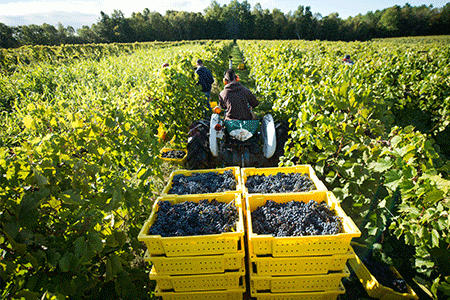Vermont farms shouldn’t pay local stormwater fees, state says, but towns disagree — and are charging them anyway
Photo courtesy of the US Environmental Protection Agency
Whether towns and cities can charge farms for stormwater utility fees is at the center of a bubbling debate between state agriculture officials and municipal leaders around Vermont.
The debate was sparked during discussions of S.115, a miscellaneous agriculture bill that began in the Senate before moving to the House. The bill originally aimed to allow municipal stormwater utility operators to create bylaws to implement stormwater control but prohibit them from assessing fees on agricultural land.
Vermont Agency of Agriculture, Food and Markets officials say municipalities legally cannot regulate land subject to a set of state standards called required agricultural practices that outline how farms manage agricultural activities to improve water quality.
“Municipalities do not have the authority to regulate stormwater on farms, and therefore cannot assess stormwater utility user fees,” said Ryan Patch, the agency’s agriculture climate and land use policy manager.
But officials from some towns and cities believe they should have the right to regulate property and how it’s used within their borders.
“One of the reasons why many of our communities have implemented a stormwater utility is that these permit obligations are held by the entire community,” said Chip Sawyer, director of planning and development for St. Albans city. “Every landowner in the community, as a member of our municipality, is on the hook for these obligations.”
So the Senate Committee on Natural Resources and Energy changed course: The bill now commissions a yearlong report to determine what municipalities can and can’t do with farms and stormwater.
The report would specifically focus on whether a property subject to the state’s required agricultural practices should be subject to a municipal stormwater entity and if that property should have to pay a fee imposed by that entity. If towns are allowed to bill farmers, the report also aims to decide whether farmers should get a discount from towns for work they’re required to do by law and can’t avoid.
The bill would also mandate a one-year suspension of any fees currently being assessed while the report is put together.
Some of the concern around the fees is how much it will cost towns to not charge farms — but also how much extra fees cost farms. In a meeting with the Senate natural resources committee in March, Dylan Zwicky of Leonine Public Affairs spoke about the costs on behalf of St. Albans town.
“We estimate our obligations between now and 2036 to be roughly $16 million, $15-16 million dollars, in investments and stormwater upgrades and infrastructure,” Zwicky said. “The hit if agriculture were to be exempted would be roughly $80,000 of $500,000 collected annually, so that is not insignificant.”
State officials worry about the hit for farmers in turn.
“We are losing so many farms because of the viability crisis,” Patch said, “and we'd rather have them put their money into water improvement projects on their farm, rather than paying for the town to clean up their stormwater needs.”
The goal of stormwater management, especially in terms of runoff from farmland, is to improve the quality of Vermont’s water. One of the main aims is lowering the amount of phosphorus in water sources — something also a focus of the state’s required agricultural practices and for towns with an MS4 permit, or a municipal separate storm sewer system permit.
Even though state law says municipalities cannot regulate agricultural practices via bylaws, many towns still assess fees on agricultural land under their MS4 permits. Those permits come from the U.S. Environmental Protection Agency and require towns and cities to monitor their stormwater systems to meet water quality goals, reduce the amount of stormwater flowing into streams and reduce the amount of phosphorus that flows off municipal lands.
“A stormwater utility provides the service of making sure that we are meeting our permanent requirements but also operating a functional stormwater system and increasing water quality for the betterment of the public good,” said Sawyer, the St. Albans city official.
The city is subject to one of those permits, and even though there isn’t any farmland in the city, Sawyer believes that farms should not be exempt from stormwater utility fees.
“They are similarly situated with every other property that has to pay utility fee, and there's nothing in law that would exempt them unless the Legislature specifically just wants to exempt them from the utility fee,” Sawyer said.
Under the state’s required agricultural practices, farmers have been responsible for most of Vermont’s phosphorus reduction.
“Vermont farmers since 2016 have been responsible for over 95% of all of the reported phosphorus reductions from the state,” said Patch, the state official. “So farmers are doing their part, and they're in crisis because of farm food pricing, which is making more and more firms go out of business.”
“They do not need to be paying for municipalities to manage their stormwater systems,” he added.








